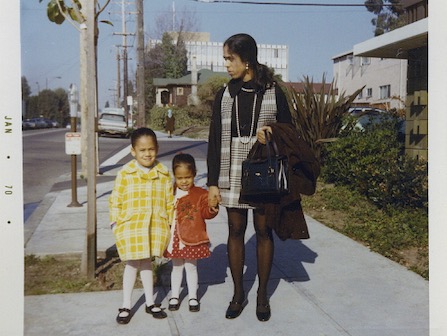
This January 1970 photo provided by the Kamala Harris campaign shows her, left, with her sister, Maya, and mother, Shyamala, outside their apartment in Berkeley, Calif., after her parents’ separation. (Kamala Harris campaign via AP)
Andrea Dew Steele remembers it being apparent from the moment they sat down to craft the very first flyer for Harris’ first campaign for public office.
“She always talked about her mother,” Dew Steele says. “When she was alive she was a force, and since she’s passed away she’s still a force.”
Dew Steele remembers when she finally met Gopalan Harris at a campaign event. It immediately struck her: “Oh, this is where Kamala gets it from.”
As much as mother and daughter shared, Gopalan Harris believed the world would see them differently. Those who knew her say she was dismayed by racial inequality in the U.S. Understanding her girls would be seen as black despite their mixed heritage, she surrounded them with black role models and immersed them in black culture. They sang in the children’s choir at a black church and regularly visited Rainbow Sign, a former Berkeley funeral home that was transformed into a vibrant black cultural center.
Though the senator talks of attending anti-apartheid protests in college and frames her life story as being in the same mold as her mother, she opted to pursue change by seeking a seat at the table.
“I knew part of making change was what I’d seen all my life, surrounded by adults shouting and marching and demanding justice from the outside. But I also knew there was an important role on the inside,” she wrote in “The Truths We Hold.”
To launch her political career, Harris had to unseat a man of her mother’s generation — a liberal prosecutor who was the product of a left-wing family, who was active in the civil rights movement and who became a hero to other activists whom he defended in court. To win, Harris ran as a tougher-on-crime alternative.
Once in office, bound by the parameters of the law and the realities of politics, Harris’ choices stirred some to dismiss her claims of progressivism even as many others fiercely defend her. She frames her philosophy in the example of her mother — concentrating on overarching goals through smaller daily steps.
“She wasn’t fixated on that distant dream. She focused on the work right in front of her,” the senator wrote.
Gopalan Harris defied generations of tradition by not returning to southern India after getting her doctorate, tossing aside expectations of an arranged marriage. Her daughter portrays her mother’s spirit of activism as being in her blood. Gopalan Harris’ mother took in victims of domestic abuse and educated women about contraception. Her father was active in India’s independence movement and became a diplomat. The couple spent time living in Zambia after the end of British rule there, working to settle refugees.
Joe Gray, who was Gopalan Harris’ boss after she returned from Canada to the Bay Area to work at Lawrence Berkeley National Laboratory, struggles to describe how a 5-foot-1-inch woman managed to fill a room with her commanding presence.
Gray, now a professor at Oregon Health and Science University, didn’t see Gopalan Harris as a “crusader in the workplace” but says she insisted on racial and gender equity, would make known her disapproval to an insensitive comment and was assertive in defending her work in cancer research.
Even from a distance, he’s struck by how much Harris reminds him of her.
“I just get the TV persona, but a lot of Shyamala’s directness and sense of social justice, those seem to come through,” he says. “I sense the same spirit.”
Lateefah Simon sensed it, too. She was a high school dropout-turned-MacArthur fellow Harris hired to join the San Francisco DA’s office to head a program for first-time offenders. Simon was skeptical of taking a role in a criminal justice system she saw as broken and biased, but Harris impressed her, and soon she had a glimpse of her mother as well.
At campaign events, Simon would watch Gopalan Harris, always in the front row, always beaming with pride. She saw how both mother and daughter were meticulous about tiny details, how they were hard workers but maintained a sense of joy in the labors, how their laugh would echo in the room.
One time, Simon says Gopalan Harris sent her away from a fundraiser because she was wearing tennis shoes, gently reminding her, “We always show up excellent.”
Years later, she heard echoes of the same message when Harris took a break from her Senate race to support her run for a seat on the Bay Area Rapid Transit District board. Descending from her campaign bus, Harris was quick with some words of advice for her friend: “Girl, clean your glasses.”
















